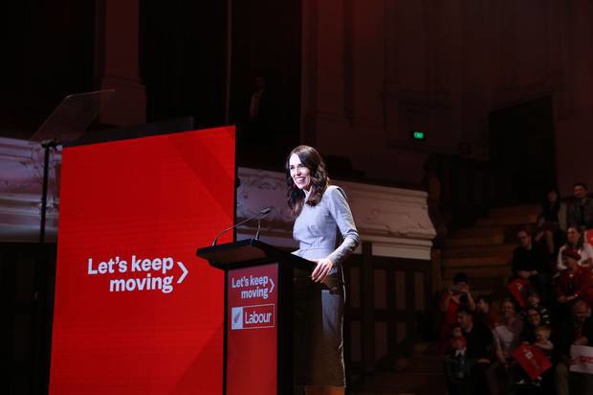Follow
the podcast on

It will be a "Covid election", says Prime Minister Jacinda Ardern, more out of necessity than anything as the country faces down its "biggest challenge for decades".
As she launched the Labour Party's re-election campaign at Auckland Town Hall on Saturday, Ardern unveiled a $311 million package to protect struggling workers and businesses from the worst impacts of Covid-19.
Three years ago, at the same venue, it was climate change that Ardern boldly claimed to be her generation's "nuclear free moment".
Ardern did not shy away from that statement during her speech, but impressed the immensity of the immediate challenge Covid-19 posed.
"It has been our new reality, and one that the team of 5 million have made work in the most extraordinary way."
Unemployment is expected to rise substantially due to Covid-19, particularly with the Government's wage subsidy extension ending soon.
The new, targeted jobs policy would take a more long-term approach, and built on the existing Flexi-wage scheme - a wage subsidy to help employers hire those on a benefit and/or at risk of unemployment.
Businesses would be able to claim a subsidy of on average $7500, and up to $22,000, to hire up to 40,000 unemployed New Zealanders.
They would have to prove the job was sustainable in the long term, and only receive the subsidy once the person had been employed for six weeks.
Another $30m would be ring-fenced to help out-of-work Kiwis start a business, providing the equivalent of the minimum wage for up to 30 hours a week.
National also has a policy that would allow recently unemployed withdraw up to $20,000 from their KiwiSaver to start a business.
The party has also pledged a $10,000 subsidy per worker for any business that took on a full-time worker, as part of a $500m scheme.
Funding for Labour's policy would come from the Wage Subsidy underspend, with $2 billion of the $2.6b budget spent, rather than the Covid Response Fund, which could be needed to fight the virus again or to reduce debt, Ardern said.
The Flexi-wage scheme was introduced in 2012, but Ardern was at pains to impress it was their policy, not National's.
They were expanding it, because it worked, she said.
In calling it a "Covid election", Ardern said: "Nobody wants it this way. The reality is this is the biggest challenge New Zealand will face for decades to come."
If re-elected they would aim to cushion the blow for the most vulnerable, but also "build back better".
"Not just about roads but make New Zealand 100 per cent renewable electricity, waste infrastructure, deal with our challenges while rebuilding our economy."
Party faithful packed the town hall, with actor and comedian Oscar Kightley MC, and powerful performances from a kapa haka group and Canadian-born country and soul singer/songwriter Tami Neilson getting the campaign under way.
The mood was joyous, verging on celebratory at times - likely buoyed on by polls showing Labour more than 20 percentage points ahead of National, polls that had soared under the Government's Covid response.
Occasional chants of "three more years" and "we love you Jacinda" erupted among some of the more vocal supporters.
Introducing Ardern was "first man" Clarke Gayford.
He received a huge roar, and shared several unique insights from living with a person recently voted the "world's most eloquent leader".
"I know it might sound a bit strange but not even once have I seen even privately her celebrate the role [of Prime Minister]."
Gayford spoke of the Cabinet papers being read in bed at midnight - "worse than toast crumbs" - and the alarm clock tune that will "forever haunt my dreams".
Through her speech Ardern reflected on the tragedies the past three years had seen.
The March 15 Christchurch mosque attacks, Whakaari/White Island, and Covid-19 had "devastated in very different ways", she said.
"[But] they drew out a response from Kiwis that was the same ... a sense of collective purpose, of determination, of kindness. They are all values we will need as we take on our next challenge – and our next challenge is huge."
While her speech largely focused on Covid-19 and jobs, she also spoke to core Labour social and environmental values, and some frustration at policies they had not got over the line, such as fixing the housing crisis and Auckland's light rail.
While her predecessors Sir John Key and Bill English were "good managers of our economy", the result was "too many families sleeping in cars, too many New Zealanders suffering from poor mental health and too many of our waterways polluted", she said.
"Keeping debt low is important to us, and we've shown that.
"But that need not be at the expense of health and education, and it shouldn't mean leaving people behind. And that is the difference between Labour and others."
- text by Michael Neilson, NZ Herald
Take your Radio, Podcasts and Music with you









